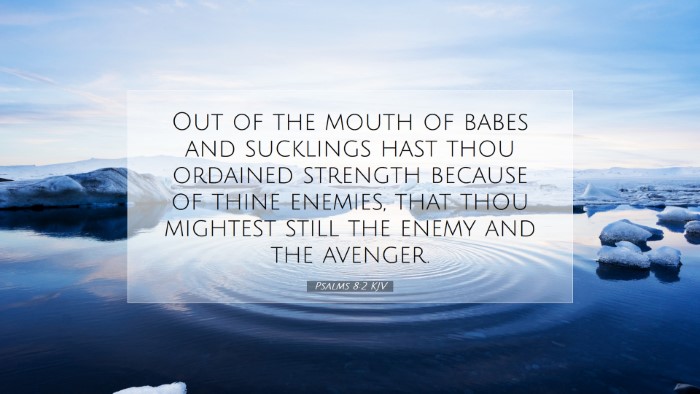Psalms 8:2 Commentary
Verse: "Out of the mouth of babes and sucklings hast thou ordained strength because of thine enemies, that thou mightest still the enemy and the avenger." (Psalm 8:2, KJV)
Introduction
This profound verse from Psalms 8:2 serves as a vibrant declaration of God's sovereignty and the surprising means through which He accomplishes His purposes. The psalm contrasts human frailty with divine strength, revealing the remarkable truth that God uses the seemingly weakest to confound the mighty. Through insights drawn from esteemed public domain commentaries, we shall explore the depth of this verse and its implications for believers, particularly for pastors, students, theologians, and Bible scholars.
Context of Psalms 8
Psalms 8 is a psalm of David, reflecting his awe at the majesty of God and the unique place that humanity holds in creation. It opens with a soaring declaration of praise: "O Lord, our Lord, how excellent is thy name in all the earth!" (Psalm 8:1). This context helps to frame verse 2, emphasizing how God's glory is revealed through His creation and the children He uses to convey His truth.
Divine Strength in Human Weakness
Matthew Henry observes that God's choice to use "babes and sucklings" highlights His perfect wisdom and power. The term "babes" refers to infants who are not yet capable of articulate speech, suggesting that God’s strength is manifested not through human eloquence or wisdom but through the simplicity and sincerity of those who trust Him. This notion is echoed in the words of Christ, who taught that we must become like little children to enter the Kingdom of Heaven (Matthew 18:3).
Albert Barnes elaborates on this by stating that the "strength" mentioned refers to praise that silences God's adversaries. The act of praise from such humble beings demonstrates the inversion of worldly wisdom, in which the strong and learned are often the ones that seem to stumble in recognizing God's truth.
God's Sovereignty over His Enemies
Adam Clarke emphasizes that the "enemy and the avenger" mentioned in the verse refer to Satan and his legions who stand opposed to God’s purposes. The irony is stark: while human beings may fail to honor God or articulate His truth, it is the meek who are used to declare His glory and showcase His power. This theme resonates with the biblical narrative where God opposes the proud but gives grace to the humble (James 4:6).
Theological Implications
The implications of this verse are significant for understanding God’s methods in engaging with humanity. It raises vital questions about the nature of strength and weakness in the Kingdom of God. As theologians reflect on the phrase "ordained strength," there is a deep realization that God’s choices often defy human logic and societal norms. He takes what is seen as weak and elevates it for His divine purposes.
- Child-like Faith: This strongly advocates for the importance of humility and child-like faith in approaching God. It serves as a reminder that intellectual prowess is not a prerequisite for divine use.
- Challenge to Pride: This verse presents a challenge to those who may rely solely on their own strength and wisdom, exhorting them to recognize their dependence on God.
- Divine Purpose in the Mundane: It illustrates how God's mission includes the mundane and the seemingly insignificant, reminding believers that their status in the world does not determine their worth to God.
Practical Applications for Believers
From a pastoral perspective, this verse can encourage congregants to embrace their identity as God's children. The following practical applications emerge:
- Cultivating Praise: Just as God ordains strength through the praises of the innocent, believers should be encouraged to cultivate a lifestyle of praise, trusting that such devotion quells spiritual opposition.
- Encouragement for the Humble: For those who feel insignificant or powerless, this passage offers hope. It reassures them that their contributions are vital to God's work, regardless of how small they may appear.
- Discipleship: In discipleship settings, this verse serves as a foundation for teaching about the value of humility and the importance of fostering a trusting relationship with God, much like a child with a parent.
Conclusion
Psalms 8:2 provides a rich tapestry of theological and practical insights. In understanding that God ordains strength out of the mouths of infants, we are reminded of His sovereignty and the unexpected channels through which He works. This verse challenges believers to rethink notions of strength and to celebrate the divine paradox that God chooses to reveal Himself through the humble and the meek. As pastors, students, theologians, and scholars delve deeper into this scripture, may it inspire a renewed commitment to trust in God's plans, confident that His strength is made perfect in our weakness.


